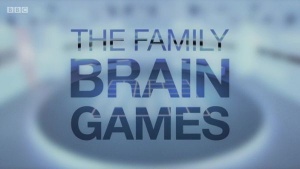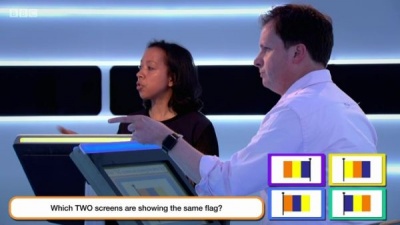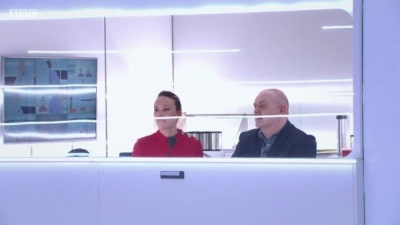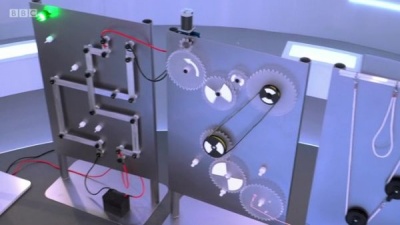The Family Brain Games
Contents |
Host
Co-host
Dr Hannah Critchlow
Voiceover: David J. Bodycombe (uncredited)
Broadcast
Label1 for BBC Two, 17 June 2019 to present
Synopsis
The BBC Press Office said:
- Eight brilliant families compete in a specially designed "games lab" in the ultimate test of intelligence.
- Each episode sees two families go head to head in a series of ingenious games, designed in association with Imperial College London. Going beyond traditional ideas about how to measure brain power, such as individual IQ, the games will also explore the power of group intelligence - and what better group to test than families.
- So alongside areas like numeracy, verbal reasoning, lateral thinking and memory, the families' mental agility will also be tested in a range of more surprising areas including communication, strategy and risk.
- Observing the game play alongside Dara is neuroscientist Dr Hannah Critchlow, who will be sharing her knowledge about the latest scientific research into intelligence.
Family Brain Games was commissioned by the Factual Entertainment unit, so the emphasis was to explain how the brain worked, and some elements of psychology. The challenges were a means to facilitate discussion, and demonstrate some of the more abstract scientific points.
With that in mind, let's look at the game element. As the name suggests, Family Brain Games was a family team challenge. Teams of four, including two children aged under 18, and two older adults.
In the heats, the games were:
- Letter Shift tests verbal reasoning and communication. Each player has one column of letters, and only they can see those letters. They can shift the letters up and down, so that reading across all four columns, a word is formed, meeting a clue given by an anonymous voiceover.
- Colour Frame looked at 2d shape recognition and manipulation, logic, but mostly communication skills. One of the family is able to see a design. Their task is to explain it to the rest of the family, who are to build it using shapes on perspex slides. The person describing can't see what's being built, and the people building can't see the original.
- Eight Things is a simple memory test. Here are eight things. They'll remain on screen until someone buzzes in, at which point they're to remember all eight. Fail, and the other player can complete the list and steal the point.
- Broken Calculator is the maths game. Each team goes head-to-head in pairs. They see a calculator with most of its buttons missing. The challenge: how to reach the target figure using only the digits and symbols available.
- Interrogation is the all-or-nothing finale, a test of logic, knowledge, lateral thinking, time management, communication, risk-taking, and knowing when to guess. Five questions are posed. The team cannot pass, and each player can only see their own screen. The players have to collectively work out the answer to the questions. There's a one-minute penalty for each incorrect answer, and the faster time overall wins. It was, in fact, possible to have lost all the previous games and still win overall after playing Interrogation, and this did happen on one occasion. This was arguably one of the few jarring notes of the show, as it seemed unfair on the family that had done so well in the previous rounds: it was rather akin to 'Krypton Mountain' in the 1995 series of The Krypton Factor, in which, once again, a contestant could do very well in the initial rounds, then come unstuck on the mountain, despite having bought more advantages with his/her points.
Heat winners, plus the two fastest losers, took part in the semi-finals:
- Word Ladder was the word game. Players create a new word by changing one letter of the previous one. Everyone hears a clue, anyone can buzz in and give an answer. Once someone has answered correctly, they step back and leave the rest of that ladder to their team-mates.
- Shape Shifters was a 3d version of the shape building game. Here, the describer was to build a collection of cubes, using Tetris-like pieces in colours and shapes.
- Pathfinder was a game for the adults, a test of planning, logic, and spatial awareness. One was the token, the other a moveable wall. On a grid of squares, the players can move horizontally or vertically, but they can only stop when their path is blocked – by the edge, one of the filled-in squares, or the other player. The objective was to land the token on an indicated target square.
- Card Slide invited the younger players to do maths. Solve an equation, then slide the eight numbered tiles so as to get the answer to line up along the bottom of the screen. Mental arithmetic is tested for the equation, planning to get the tiles in the right place, and short-term memory to remember the answer.
- Inquisition again concluded the show.
Winners from all three semi-finals played the final:
- Cross Purposes was a crossword, all the words are linked by some sort of connection. First team to buzz in and give a correct answer got control of the puzzle, and were the only ones able to score points. A test of vocabulary, spelling, and language processing.
- Chain Reaction tested mechanical and engineering intelligence, with a little spatial awareness and a chunk of logic. Each person was allocated one part of a mechanism, and only they could build it. While one person was building, all the others remained seated – they could advise, shout, talk, but couldn't stand up and take over. The four tasks were very different – arrange pieces to allow a ball to travel down, build a pulley system to bring a ball up, use cogs to operate the pulley system, and build an electrical circuit to turn the cogs. When it worked, it was spectacular.
- A round of Inquisition identified the worst performer.
- The top two took part in Ultimate Brain Game: logic and vocabulary and maths and memory and lateral thinking questions on the buzzer; the families can confer. First to five points wins the series.
Family Brain Games was primarily a science show, and the contest was kept simple. Many of these challenges were familiar from other television shows: A Word in Your Ear, Relatively Speaking, The Krypton Factor, Dog Eat Dog, Chain Letters, Crosswits, Incredible Games, and Mousetrap were all alluded to - The Crystal Maze contributed a futuristic set. The scoring was elegantly simple: a 50 second head-start in Inquisition for winning a round, and faster score after Inquisition wins.
The mixture of science and entertainment worked well: viewer reaction was a near-unanimous thumbs up, helped by a very positive presentation from Dara Ó Briain, and a general feeling that families had enjoyed themselves and been well looked after.
Champions
The Smiths: Elaine, Chris, Heidi, and Daisy





